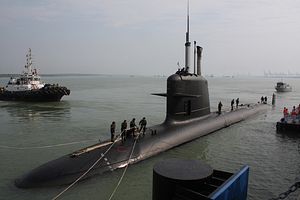The Indian Navy successfully test fired an anti-ship missile from a Scorpene-class (Kalvari-class) diesel-electric attack submarine in the Arabian Sea on March 2, according to an Indian Ministry of Defense (MoD) press release.
“The missile successfully hit a surface target at extended ranges during the trial firing, held this morning,” the March 2 statement reads. “This missile launch is a significant milestone, not only for the Kalvari, which is the first in a series of Scorpene class submarines being built in India, but also in enhancing the Indian Navy’s sub-surface warfare capability.”
French shipbuilder Direction des Constructions Navales Services (DCNS) was awarded a $4.16 billion contract (known as Project 75-I) in 2005 for the construction of six diesel electric attack submarines for the Indian Navy in cooperation with state-run Mazgaon Docks Limited (MDL). The Project 75-I deal also included the option of building six additional Scorpene-class subs at MDL in Mumbai.
The lead boat of the new class of attack submarines, the INS Kalvari, is expected to be commissioned this summer. The second Kalvari-class sub, the INS Khanderi, was launched in January of this year and is expected to be delivered to the Indian Navy by the end of 2017. The other four boats are all slated for delivery by 2020 at an interval of nine months.
As I reported previously, the Kalvari-class/Project 75-I program encountered has faced repeated delays in the past decade for numerous reasons including India’s painfully slow military procurement process (See: “India’s Submarine Fleet Faces Further Delays”).
The Indian MoD did not specify the specific type of missile test fired merely noting that all six Kalvari-class boats “will be equipped with this anti-ship missile, which has a proven record in combat. These missiles will provide the submarines the ability to neutralize surface threats at extended ranges.” However, it appears likely that the anti-ship missile in question is the French-made Exocet SM39 anti-ship missile.
The Exocet SM39 anti-ship missile is a sea-skimming, subsonic, solid-fueled anti-ship missile with an estimated operational range of 50-70 kilometers depending on the variant. “It has been designed to attack small- to medium-size surface warships. The missile is launched from a torpedo tube in a water-tight launched capsule,” I reported elsewhere.
According to European Defense contractor MBDA, the missile’s manufacturer, “the aerial missile is ejected as soon as it breaks the surface, to ensure a very low culmination altitude. It then rapidly homes into the target at sea skimming level: it uses an inertial navigation system followed by autonomous terminal guidance from an active RF seeker.”
The acquisition of the Exocet came under intense scrutiny following the August 2016 disclosure of a data leak at French shipbuilder Direction des Constructions Navales Services (DCNS), which publicly revealed sensitive details on the anti-ship missile including launch details, the number of targets the missile is capable of processing, and how many targets could be downloaded before firing.
Nevertheless, the Indian MoD insisted that the leaked data does not constitute a security compromise and reiterated its intention to procure the missiles for the Kalvari-class. As I explained: “For one thing, Pakistan is operating the same type of missile and would be privy to much of the information leaked in the documents. Also, the one thing that would compromise the sub’s combat capabilities—the source code of the [Kalvari] Scorpene-class’ fire control system—has apparently not been leaked.”
































